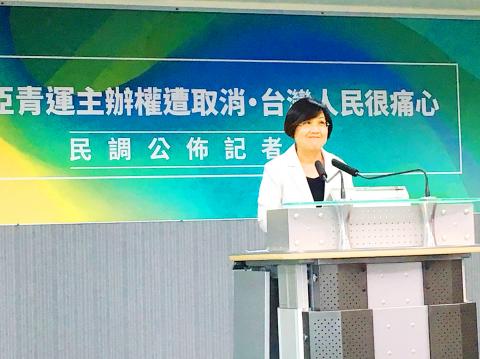The Democratic Progressive Party (DPP) is seeking applicants for its Legislative Yuan internship program, Deputy Secretary General Hsu Chia-ching (徐佳青) said yesterday.
The three-year-old program aims to provide political experience for those who might want to become politicians.
The DPP is seeking a maximum of 35 applicants, and 18 finalists would be chosen based on their results in a training program and they would intern with 15 lawmakers for four months, or one legislative session, Hsu said.

Photo: Yang Chun-hui, Taipei Times
Six training sessions are planned, covering budget reviews, drafting of legislation, news conferences and public hearings, serving the public and the use and application of new media, DPP Department of Youth Development Director Ho Meng-hua (何孟樺) said.
The goal is to prepare the interns before and after they start their internships, Ho said.
Internet registration for the program will begin on Friday next week, Ho said.
Interns are to receive NT$13,000 a month, with a maximum 80-hour work month, and receive labor and health insurances, Ho said.
The party is the most systematic and the most able political party in terms of youth development, and it welcomes all young people interested in politics to enroll, Hsu said.
For those interested in devoting themselves to public affairs, the internship would allow them to learn more about the work, Hsu added.
More than 70 percent of the interns in last year’s program said they were willing to enter politics, with three continuing on as Legislative Yuan assistants, while two others passed the Ministry of Foreign Affairs’ national exam, Hsu said.
Former program participants who returned to their studies after their internships have said they were still interested in entering politics, Hsu added.
Lawmakers participating in this year’s program are Deputy Legislative Speaker Tsai Chi-chang (蔡其昌), Chiang Yung-chang (江永昌), Karen Yu (余宛如), Lu Sun-ling (呂孫綾), Sun Yu-chin (孫玉琴), Rosalia Wu (吳思瑤), Wu Kun-yuh (吳焜裕), Lee Li-feng (李麗芬), Chou Chun-mi (周春米), Pasuya Yao (姚文智) Shih Yi-fang (施義芳), Huang Wei-che (黃偉哲), Chen Man-li (陳曼麗), Tsai Yi-yu (蔡易餘), Tsai Shih-ying (蔡適應) and Chiang Chieh-an (蔣絜安).

The Central Weather Administration (CWA) today issued a sea warning for Typhoon Fung-wong effective from 5:30pm, while local governments canceled school and work for tomorrow. A land warning is expected to be issued tomorrow morning before it is expected to make landfall on Wednesday, the agency said. Taoyuan, and well as Yilan, Hualien and Penghu counties canceled work and school for tomorrow, as well as mountainous district of Taipei and New Taipei City. For updated information on closures, please visit the Directorate-General of Personnel Administration Web site. As of 5pm today, Fung-wong was about 490km south-southwest of Oluanpi (鵝鑾鼻), Taiwan's southernmost point.

Tropical Storm Fung-Wong would likely strengthen into a typhoon later today as it continues moving westward across the Pacific before heading in Taiwan’s direction next week, the Central Weather Administration (CWA) said. As of 8am, Fung-Wong was about 2,190km east-southeast of Cape Oluanpi (鵝鑾鼻), Taiwan’s southernmost point, moving westward at 25kph and possibly accelerating to 31kph, CWA data showed. The tropical storm is currently over waters east of the Philippines and still far from Taiwan, CWA forecaster Tseng Chao-cheng (曾昭誠) said, adding that it could likely strengthen into a typhoon later in the day. It is forecast to reach the South China Sea

Almost a quarter of volunteer soldiers who signed up from 2021 to last year have sought early discharge, the Legislative Yuan’s Budget Center said in a report. The report said that 12,884 of 52,674 people who volunteered in the period had sought an early exit from the military, returning NT$895.96 million (US$28.86 million) to the government. In 2021, there was a 105.34 percent rise in the volunteer recruitment rate, but the number has steadily declined since then, missing recruitment targets, the Chinese-language United Daily News said, citing the report. In 2021, only 521 volunteers dropped out of the military, the report said, citing

Nearly 5 million people have signed up to receive the government’s NT$10,000 (US$322) universal cash handout since registration opened on Wednesday last week, with deposits expected to begin tomorrow, the Ministry of Finance said yesterday. After a staggered sign-up last week — based on the final digit of the applicant’s national ID or Alien Resident Certificate number — online registration is open to all eligible Taiwanese nationals, foreign permanent residents and spouses of Taiwanese nationals. Banks are expected to start issuing deposits from 6pm today, the ministry said. Those who completed registration by yesterday are expected to receive their NT$10,000 tomorrow, National Treasury